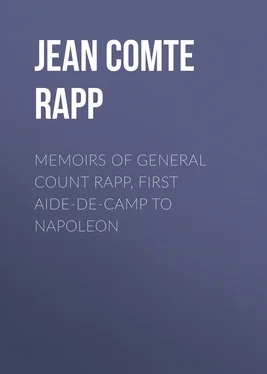Jean Comte Rapp - Memoirs of General Count Rapp, First aide-de-camp to Napoleon
Здесь есть возможность читать онлайн «Jean Comte Rapp - Memoirs of General Count Rapp, First aide-de-camp to Napoleon» — ознакомительный отрывок электронной книги совершенно бесплатно, а после прочтения отрывка купить полную версию. В некоторых случаях можно слушать аудио, скачать через торрент в формате fb2 и присутствует краткое содержание. Жанр: Биографии и Мемуары, История, foreign_edu, foreign_antique, foreign_prose, на английском языке. Описание произведения, (предисловие) а так же отзывы посетителей доступны на портале библиотеки ЛибКат.
- Название:Memoirs of General Count Rapp, First aide-de-camp to Napoleon
- Автор:
- Жанр:
- Год:неизвестен
- ISBN:нет данных
- Рейтинг книги:5 / 5. Голосов: 1
-
Избранное:Добавить в избранное
- Отзывы:
-
Ваша оценка:
- 100
- 1
- 2
- 3
- 4
- 5
Memoirs of General Count Rapp, First aide-de-camp to Napoleon: краткое содержание, описание и аннотация
Предлагаем к чтению аннотацию, описание, краткое содержание или предисловие (зависит от того, что написал сам автор книги «Memoirs of General Count Rapp, First aide-de-camp to Napoleon»). Если вы не нашли необходимую информацию о книге — напишите в комментариях, мы постараемся отыскать её.
Memoirs of General Count Rapp, First aide-de-camp to Napoleon — читать онлайн ознакомительный отрывок
Ниже представлен текст книги, разбитый по страницам. Система сохранения места последней прочитанной страницы, позволяет с удобством читать онлайн бесплатно книгу «Memoirs of General Count Rapp, First aide-de-camp to Napoleon», без необходимости каждый раз заново искать на чём Вы остановились. Поставьте закладку, и сможете в любой момент перейти на страницу, на которой закончили чтение.
Интервал:
Закладка:
Jean Comte Rapp
Memoirs of General Count Rapp, First aide-de-camp to Napoleon
CHAPTER I
I do not pretend to be an historical character; but I was long near a man who has been the object of base misrepresentations, and I commanded brave troops whose services have been disowned. The former overwhelmed me with favours; the latter would have laid down their lives for me: these things I cannot forget.
I served in the army for several years; and I was successful in some enterprises, though without gaining distinction, as is usual with those who hold subaltern rank. At length I was fortunate enough to engage the attention of General Desaix. Our advance guard, which had been thrown into disorder, was speedily rallied. I hastened forward with a hundred hussars; we charged the Austrians, and succeeded in putting them to flight. We were almost all covered with wounds; but for these we were amply rewarded by the praises that were bestowed on us. The General made me promise to take all requisite care of myself, and he delivered to me the most flattering attestation that ever a soldier obtained. I mention this circumstance, not because it procured me a pair of epaulettes, but because it obtained for me the friendship of that great man, and was the origin of my fortune. The attestation was as follows:
"I, the undersigned General of Division, commanding the right wing of the above mentioned army, certify that citizen Jean Rapp, lieutenant in the 10th regiment of Horse Chasseurs, has served under my command with the said regiment during the two last campaigns; that on all occasions he has given proofs of singular intelligence, presence of mind and courage; that he has been wounded three different times; and that, on the 9th Prairial of the year II, at the head of a company of chasseurs, he attacked a column of the enemy's hussars, whose number was five times greater than his own force, with such devoted intrepidity, that he cut them to pieces, covering the retreat of a portion of our troops, and bearing away the honour of the victory. It cannot be too deeply regretted that he has been the victim of his valour, and has been dangerously wounded in such a way as to be deprived of the use of his arm. He is a worthy object of national gratitude, and well deserves to be appointed to some honorable post, should he be rendered incapable of more active service. I attest that citizen Rapp bears with him the friendship and esteem of all who know him.
Desaix."Having become the aide-de-camp of the modest conqueror of Offenburgh, I fought under him in the campaigns of Germany and Egypt. I was made the chief of a squadron at Sediman; where I had the happiness, at the head of two hundred brave troops, to carry off the last remnant of the Turkish artillery, and I was promoted to the rank of Colonel, at Samanhout, near the ruins of Thebes. I was severely wounded in this last affair; but I was honorably mentioned in the dispatches of the General-in-chief.
On the death of the brave Desaix, who was killed at Marengo, at the moment when he had decided the victory, the First Consul deigned to appoint me to a post about his own person. The favour which he would have conferred on the conqueror of Upper Egypt was extended to me. From that time I was in some manner permanently established, and my connexions became more extended.
Zeal, frankness, and some degree of military talent, procured for me the confidence of Napoleon. He frequently remarked to those about him, that few possessed a greater share of natural good sense and discernment than Rapp. These praises were repeated to me, and I must confess I was flattered by them: if this be weakness, I may be excused; every one has some foible. I would have sacrificed my life to prove my gratitude to the First Consul. He knew this; and he often repeated to my friends that I was a grumbler—that I had a poor head but a good heart. He treated both me and Lannes familiarly, using the pronoun thou when he spoke to us; if he addressed us by you or Monsieur le General , we became alarmed, we were sure that we were out of favour. He had the weakness to attach importance to a gossiping police system which for the most part deceived him by false reports. That odious system of police embittered the happiness of his life; it frequently incensed him against his best friends, his relations, and even his wife.
Napoleon attached but little importance to mere courage, which he regarded as an ordinary kind of merit, common to all Frenchmen: he set a higher value on intrepidity; and he was willing to pardon every fault in an intrepid soldier. When any one solicited a favour, either at an audience or a review, he never failed to enquire whether he had been wounded. He declared that every wound was a quarter of nobility. He honoured and rewarded the individuals who were thus distinguished, and he had good reasons for so doing. However, he soon perceived that they did not attend the antechambers, and he opened them to the old nobility. This preference offended us; he remarked this, and was displeased at our taking offence. "I see plainly," said he to me one day, "that these nobles whom I have placed in my household are disagreeable to you." I, however, very well deserved the privilege. I had erased several gentlemen from the list of emigrants; I had procured places for some, and had given money and pensions to others. Some have remembered these favours, but the majority have forgotten them; and consequently my purse has been closed since the return of the King. Though my object was to relieve misfortune, and not to obtain gratitude, yet I did not choose that the emigrants should interpose between us and the great man whom we had raised on the shield.
I had forgotten this disagreeable scene; but Napoleon did not forget any offensive observations that might escape him. In vain he sought to assume the mask of severity; his natural disposition subdued his efforts, and kind feelings always gained the ascendancy. He called me to him: he spoke to me of the nobles and the emigrants; and suddenly recurring to the scene above alluded to, he said: "You think, then, that I have a predilection for these people; but you are mistaken. I employ them, and you know why. Am I connected with nobility? I, who was a poor Corsican gentleman?"—"Neither I nor the army," I replied, "have ever inquired into your origin. Your actions are sufficient for us." I related this conversation to several of my friends, among others to Generals Mouton and Lauriston.
Most of these same nobles, however, allege that they had yielded only to compulsion. Nothing can be more false. I know of only two who received Chamberlain's appointments unsolicited. Some few declined advantageous offers; but with these exceptions, all solicited, entreated, and importuned. There was a competition of zeal and devotedness altogether unexampled. The meanest employment, the humblest offices, nothing was rejected; it seemed to be an affair of life and death. Should a treacherous hand ever find its way into the portfolios of M.M. Talleyrand, Montesquiou, Segur, Duroc, &c., what ardent expressions may be found to enrich the language of attachment. But the individuals who held this language now vie with each other in giving vent to hatred and invective. If they really felt for Napoleon the profound hatred which they now evince, it must be confessed that, in crouching at his feet for fifteen years, they did strange violence to their feelings. And yet all Europe can bear witness, that from their unrestrained manner, their never-varying smile, and their supple marks of obedience, their services seemed to be of their own free choice, and to cost them but little sacrifice.
Читать дальшеИнтервал:
Закладка:
Похожие книги на «Memoirs of General Count Rapp, First aide-de-camp to Napoleon»
Представляем Вашему вниманию похожие книги на «Memoirs of General Count Rapp, First aide-de-camp to Napoleon» списком для выбора. Мы отобрали схожую по названию и смыслу литературу в надежде предоставить читателям больше вариантов отыскать новые, интересные, ещё непрочитанные произведения.
Обсуждение, отзывы о книге «Memoirs of General Count Rapp, First aide-de-camp to Napoleon» и просто собственные мнения читателей. Оставьте ваши комментарии, напишите, что Вы думаете о произведении, его смысле или главных героях. Укажите что конкретно понравилось, а что нет, и почему Вы так считаете.












